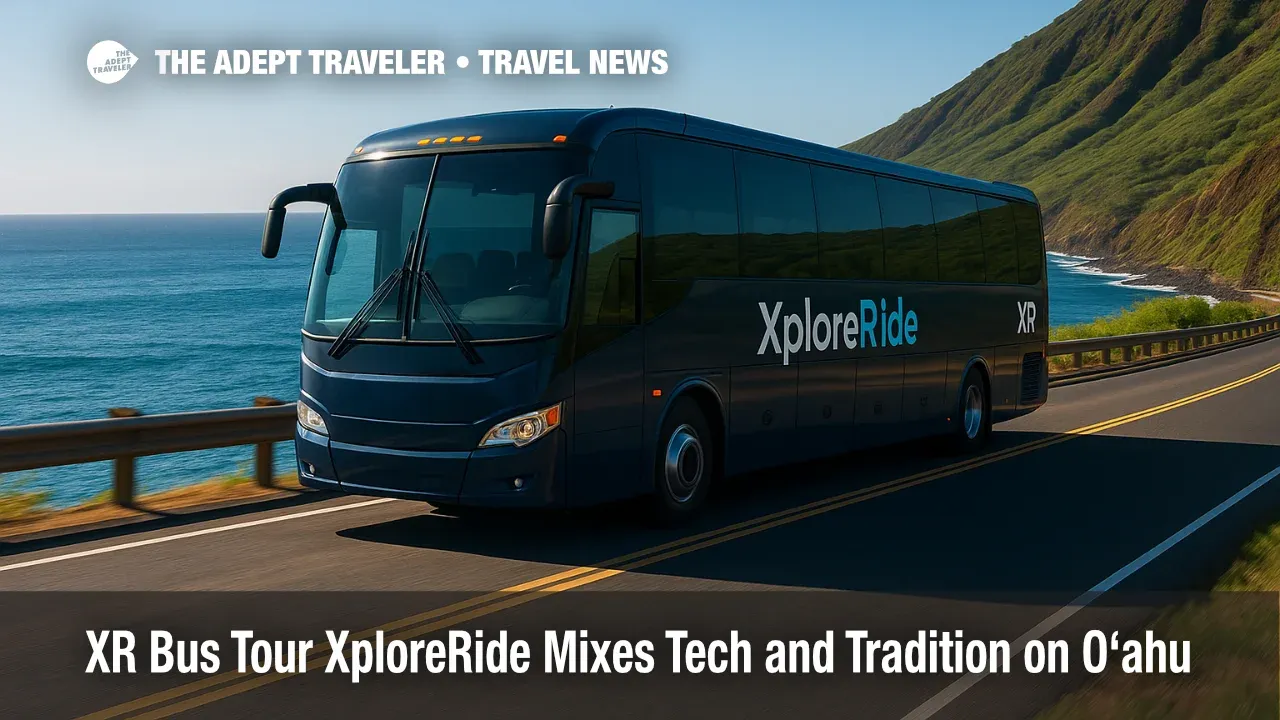XR Bus Tour XploreRide Mixes Tech and Tradition on Oʻahu

Visitors to Oʻahu now have a next-generation way to see the island: XploreRide, an extended-reality (XR) bus tour that overlays location-synced animations, archival imagery, and indigenous art onto real-world views as riders circle Hawaiʻi's most popular sights. The experience-launched July 22 with a traditional Hawaiian blessing-combines VR headsets, panoramic windows, immersive audio, and cultural storytelling crafted in partnership with local advisors, aiming to deepen understanding of Hawaiʻi's history while keeping tourism footprints light.
Key Points
- Why it matters: Shows how destination marketers can pair emerging tech with cultural stewardship.
- First XR sightseeing bus in Hawaiʻi; operated by Hawaii HIS Corporation.
- Virtual and real scenery blend to depict hula, chants, marine life, and volcanic landscapes.
- Shared buses cut individual car traffic along Waikīkī and Diamond Head corridors.
- Fleet uses modern, low-emission vehicles; public bookings now open for summer.
Snapshot
XploreRide equips each traveler with a custom headset that queues XR content exactly where the bus is on its loop-think deep-sea dives while cruising Kalaniana'ole Highway or archival footage hovering above royal landmarks. Manager Yuki Toshida calls it "a new way to ride ... a new way to see Hawaiʻi," underscoring that the goal is connection, not gimmickry. Cultural practitioners scripted narration, while local musicians scored chants and ambient sound. Tours depart daily from central Honolulu, last about 90 minutes, and include multilingual support in Japanese and English.
Background
Hawaiʻi welcomed 9.5 million visitors in 2024, sparking debates over how to balance economic benefit with cultural integrity. Tech-driven attractions-from Waimea Valley's AR plant app to Bishop Museum's holographic storytellers-have proliferated, yet critics warn of superficial "edutainment." XploreRide's creators enlisted kumu hula Blaine Kamalani Kia and other advisors to vet every scene for historical accuracy and respectful imagery. By clustering guests in buses rather than rental cars, HIS Hawaii aligns the project with the state's Mālama Hawaiʻi regenerative-tourism campaign, which urges suppliers to reduce emissions and amplify Native Hawaiian voices.
Latest Developments
Launch Ceremony Highlights
A dawn ceremony at Kualoa welcomed community leaders, influencers, and media. Blessings invoked ancestral guardians, and riders previewed underwater reef sequences that appear while driving past Hanauma Bay. Early feedback praised seamless headset calibration and rich audio design, though some testers suggested shorter headset segments for motion-sensitive guests.
Immersive Technology Suite
The proprietary system fuses LiDAR mapping, GPS triggers, and lightweight VR optics. Panoramic coach windows remain visible, so guests can lift headsets to compare virtual overlays with the live vista-reinforcing place-based learning rather than isolating travelers behind screens. Content updates will roll out quarterly, allowing seasonal stories about humpback whales or makahiki festivals.
Sustainability Commitments
HIS Hawaii says each full bus eliminates up to 12 rental cars from Oʻahu's roads. The fleet's Euro VI-equivalent engines and idle-cut systems aim to cut per-guest CO₂ output by 40 percent versus self-drive tours. The company is negotiating future upgrades to hydrogen fuel-cell coaches.
Analysis
For destination managers worldwide, XploreRide illustrates three takeaways. First, XR bus tours can lengthen visitor stays: riders often return to sites seen virtually, extending on-island spending. Second, cultural codesign is non-negotiable; early, deep consultation earns community support and mitigates "Disneyfication" backlash. Third, shared mobility plus immersive tech answers overtourism critics by moving guests collectively while delivering richer narratives than window-only commentary. Expect copycat models in hotspots like Iceland's Golden Circle or Peru's Sacred Valley, where fragile landscapes and dense lore coexist. However, operators must budget for continual content refreshes and device maintenance; outdated visuals or scratched lenses can sink TripAdvisor scores fast. Ultimately, the XR approach complements, rather than replaces, guides on foot or traditional circle-island tours-appealing to tech-savvy millennials without alienating slower-paced travelers.
Final Thoughts
XploreRide positions Oʻahu at the forefront of immersive sightseeing by blending XR wizardry with indigenous storytelling and eco-minded transport. If the concept scales, Hawaiʻi could redefine "look, don't touch" tourism, letting travelers dive beneath waves and back through centuries-without ever leaving their seats-while preserving the very vistas that inspire the journey. For visitors planning 2025-26 vacations, the XR bus tour Oʻahu offers a compelling first stop.
